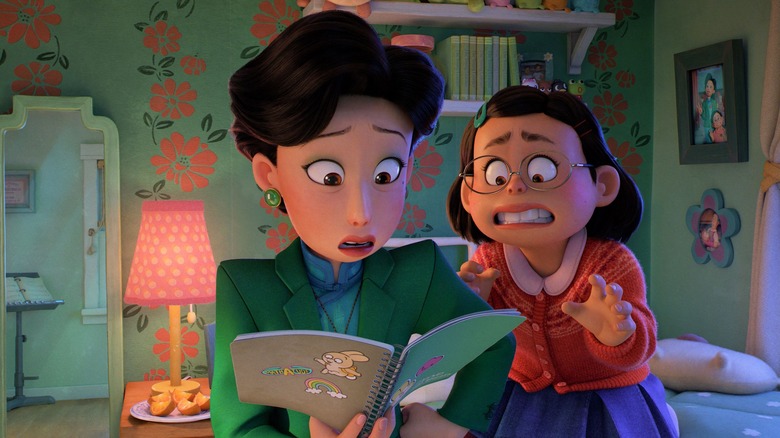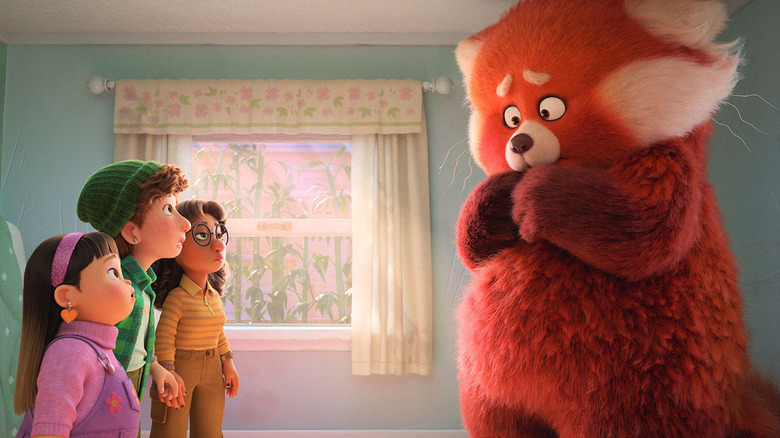Turning Red Ending Explained: Growing Up But Not Growing Apart
Director Domee Shi really made something special with the latest Pixar release, "Turning Red." Meilin "Mei" Lee (Rosalie Chiang) is your typical 13-year-old girl — she loves stickers, playing the flute, hanging with her best friends, eyeballing the cute clerk at the convenience store, and singing along to the boy band 4*Town. Well, as long as she's not around her parents. At home, Mei is a dutiful daughter who lives to appease her parents, even donning a giant red panda mascot suit at the temple their family runs. It's clear that Mei, like many pubescent kids, is caught between two worlds — the generational traditions of her family and her budding existence as a teen in the new millennium. As if navigating these two sides of her identity weren't hard enough, Mei also wakes up one day to discover that when her emotions get too extreme, her body POOFS! and she takes on the form of a gigantic red panda.
As it turns out, Mei's red panda-itis is genetic, passed on through the female familial line, including her mother, Ming (Sandrah Oh). "This happened already?" Mei's dad Jin (Orion Lee) says when he sees his fluffy, red, daughter. "What did you say?" Mei retorts.
Suddenly, I was gobsmacked with the memory of my own mother picking me up from the nurse's office as a menstruating pre-teen, panicking like Carrie White and convinced I was dying when my mom came in and sighed, "I thought I had a few more years before I'd have to explain this." For the rest of the film, Mei is forced to learn how to navigate her new panda-side, which is embraced immediately by her friends Miriam (Ava Morse), Priya (Maitreyi Ramakrishnan), and Abby (Hyein Park), but part of a long-standing tradition of repression for the women in Mei's family.
The conflict of growing up
Shortly after discovering the panda transformation, Mei does her best to control it. She realizes that by maintaining a neutral status and learning to regulate her emotions, she can learn to keep her panda side in check. It's a wonderful sign of growth for her, because learning emotional competency is a very difficult process and is something that most of us struggle with for our entire life. Mei is supported unconditionally by her friends, which helps her even more to keep her emotions in check but by learning how to keep control of her panda, it also allows for the group to use the panda to their advantage. After Mei's mother tells her that she will not be going to see the 4*Town concert with her friends, Mei takes advantage of her adorable panda talents as a means to raise money. She and her friends become young entrepreneurs, creating merchandising and event opportunities for profit.
Unfortunately, Mei later discovers even after all of the funds have been secured, that the night of the concert is the same night as the planned familial ritual to rid her of the panda for good. Mei's double lives can no longer co-exist and she is forced to choose between her friends at the 4*Town concert, or appeasing her family. Mei commits the cardinal sin of teenagedom, and she sells out her friends and lets them take the fall. She goes home with her mother, and reverts back to the dutiful, "perfect, little, Mei-Mei."
Embrace and empathize
When the ceremony to rid Mei of the panda begins, it's the first time she truly takes the time to interrogate how she truly feels, and what it means. Just as she's about to say goodbye to her panda for good, she resists the ceremony and runs away to the 4*Town concert. Upon arrival, Mei makes amends with her best friends — her supportive, found family. There's one problem, though, her bailing on the ceremony has caused her mom to absolutely lose it, and unleashes the gigantic, Kaiju-sized panda within her. Suddenly, the 4*Town concert is interrupted by Ming's stadium sized panda, and it's up to Mei, and all of the other women in her life to unleash their own inner pandas and subdue Ming.
The family of pandas all work together and finally get Ming under control, but with time running out, they need to finish the panda ritual or else all of the women will forever be at risk of spontaneously unleashing their panda. During the ritual, Mei seeks out her mother Ming in a "supernatural panda forest dimension," and finds her spirit ... as a teenage girl herself. Mei sees the 13-year-old version of her mother — scared, unsure of what to do, and not wanting to disappoint her own mother. It's at this moment that Mei realizes that her mother was just like her once, and while she respects her mother's decision to put her panda in submission, this isn't right for her. Mei wants to keep her panda. She loves this side of herself. And she wants to break the generational tradition by not completing the ritual. Ming joins her own mother and her aunts as they leave the panda dimension, and Mei lets the time run out, thereby keeping the panda a permanent part of her.
Two worlds living as one
With Mei embracing her inner panda, tourism at the family temple is thriving. Mei and her mother have found a balance between the traditional ways of old, and Mei's evolution alongside the changing times. While the great Toronto panda conflict of "sometime between 2002-2003," was a difficult moment of growing pains for the family, it was the best possible thing that could have happened to the family.
They were able to see each other for the first time as full beings with their own individual wants and desires, and were able to make amends regarding their imperfect behavior as a family. Mei's friends are finally given the reflective value they've always deserved from her family, and Mei's family are finally understood as more than just authoritative adult figures. As it turns out, all it takes is a little bit of empathy to evolve into better people.



